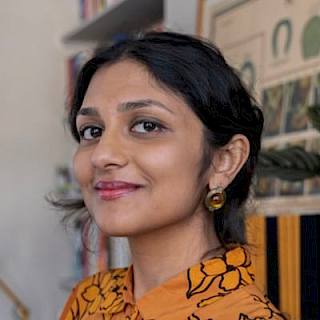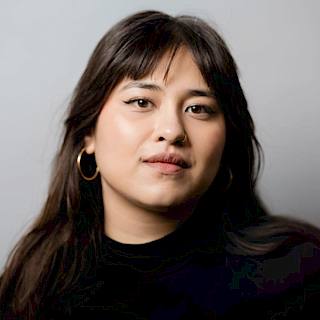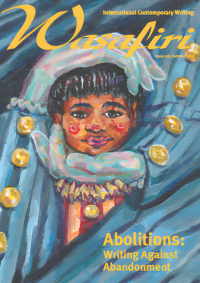On Guest-Editing Abolitions – Writing Against Abandonment: Farhaana Arefin and Dr Abeera Khan
Ahead of our launch event on 4 July, we spoke to co-guest editors Farhaana Arefin and Dr Abeera Khan about curating, commissioning, and editing Wasafiri 118: Abolitions - Writing Against Abandonment. Our summer 2024 special issue considers abolitionist organising within and beyond our current violent climate, and the concept of abandonment as outlined by Ruth Wilson Gilmore’s as the ‘abdication of responsibility’ by capital and the state. In this interview, Arefin and Khan talk about the act of writing as a tool to situate revolutionary literature.
Wasafiri: Please tell us how you came to co-edit together. What inspired you to do this issue?
Farhaana Arefin: Abeera and I have been friends for several years and first came to know and care for each other in the context of abolitionist feminist organising. Co-editing this special issue is the first time we’ve worked together professionally — a big risk to take in any relationship, but one that definitely paid off. Thinking with each other is always enlivening, and we each bring very complementary skills and fields of expertise to the work. Most importantly, with the issue coming together during unthinkably violent times, Abeera’s support, understanding, and political clear-sightedness – on a personal level – often kept me from getting lost in the darkness.
The idea for a Wasafiri issue themed around abolition and liberation struggles had vaguely started to constellate for me while I was working as the magazine’s Deputy Editor through 2022, when I had the chance to delve into its rich, revolutionary archive, in particular Wasafiri 80, a special issue on Palestine. I remember sending Abeera a voice note that December asking if she’d like to work on a pitch with me, and she was immediately on board. I think we were both equally excited — by the project, by each other’s enthusiasm and creative energy, and by the opportunity to collaborate to bring something special forward as guest co-editors for what would become the magazine’s fortieth-anniversary summer issue.
Could you talk more about how you drew from Ruth Wilson Gilmore’s work on ‘organised abandonment’?
Abeera Khan: Ruth Wilson Gilmore’s conceptualisation of organised abandonment, I think, is politically potent because it cuts through the banalisation of structural violence. It makes explicit its orchestrated nature, even if – especially if – that violence is not spectacular. In turn, abandonment names the cessation of support, or, as Gilmore describes it, the ‘abdication of responsibility’ by capital and the state. Organised abandonment is compelling because, as an intellectual frame, it sharpens our confrontation with the crises and contradictions that arise from the machinations of racial capitalism. According to Gilmore, this withdrawal of support goes hand in hand with organised violence, both mutually reinforcing each other.
Farhaana and I were conscious that not all the writing collected in this issue neatly fit under ‘abolition’. While Jun Pang’s ‘Against Innocence’ and the interviews with Nejma Collective and Mwasi Collectif engage with abolition, and texts such as Basil Farraj’s ‘Rejecting Defeat and Approaching Liberation’ or Roba AlSalibi’s translation of Layan Kayed’s ‘The Prison As a Text’ on carcerality implicitly fall under it, many of our contributors’ pieces do not necessarily identify abolition. But the throughline was the refusal – creative, intellectual, and political – of the premature death that is wreaked by organised abandonment and violence. Even if our contributors do not name abolition, they are implicitly thinking with it in their assessment of our current conditions and in the articulations of their desires for transformation.
In your editorial to the issue, you also talk about writing as one possible tool in the orientation against abandonment. Could you expand on this?
FA: With our editorial, we thought it was important to be clear in our position that radical literature is not for its own sake — instead, writing is one means that we can direct towards the end goal of liberation from oppression. We wanted neither to diminish the act of writing as resistance nor to glorify it, but rather to situate revolutionary literature – its production, circulation, and consumption – in the context of much broader struggles, forged through myriad other actions undertaken alongside, and sometimes instead of, writing. The prisoner’s hunger strike analysed in Basil Farraj’s article, the caregiving of friends illuminated in Pear Nuallak’s short story, the mourning practices recounted in Maymana Arefin’s piece of life writing, the mothering work honoured in Mahrang Baloch’s essay are all examples of this. Additionally, just as Revolutionary Papers describe their approach to the historical archive in this issue, we wanted to be attentive to all the labour that builds literature and our revolutionary movements, understanding that at times the greater task of resisting abandonment might require us to abandon writing for other tools.
In different ways, all of the poems in this special issue – by Nat Raha, Sarah Lasoye, N M Danish (translated by Haider Shahbaz), and Shripad Sinnakaar – embody the premise that the text itself has no absolute or inherent ethical or political value divorced from the circumstances of its creation or of the audience’s engagement with it. To claim otherwise and become overawed by the meaningfulness of ‘our work’ can lead to dangerous failures in prioritisation. I’m thinking of a friend whose colleague declined to strike in solidarity with Palestinians late last year out of a misguided belief that teaching a poetry class in a Western university’s English department was the braver and more important action for the Palestinian liberation struggle. But there are also examples that are closer to home of mistakes born from the same line of reasoning, when each of us can get swept up in the political mission we have attached to our work and become thoughtless and unrelenting in how we carry it out. As we describe in the editorial, Abeera and I tried to care for ourselves, each other, our contributors, and our overarching principles in the political context of the moment in how we worked together on this issue.
AK: Farhaana works in publishing and I work in higher education. Professionally, we’re both in industries that, at least in our politicised and leftist corners, exalt the act of writing. In this regard, working on this issue has been an exercise in humility. We began planning the issue just weeks before the war broke in Sudan on 15 April 2023 and many months before 7 October. While it’s important to resist exceptionalising both these dates as singular events or flashpoints – they are symptomatic of material histories of extraction and elimination – there is something to be said about navigating their ongoing aftermath. Being in community with people who are directly impacted by the heightened and prolonged militarised violence that continues in the wake of 15 April and 7 October, we found that writing often felt like a negligible act, and working on this issue even more so.
For instance, we made several attempts to commission a piece on the neighbourhood committees or ‘resistance committees’ in Sudan that are mobilising mutual aid networks for the provision of, for example, shelter and healthcare. The authors we approached were unavailable or had to drop out from contributing to the issue because they were navigating more pressing issues. Ultimately, we had to accept that we could not commission such a piece of writing on the publishing timelines we were given. We were sympathetic to contributors, actualised and potential, who had to pause their writing intermittently or indefinitely in the pursuit of other political strategies. As we said in our editorial, we often worked on this issue despite, not because of, circumstance.
What was the curation process like? Which topics, themes, regions, and voices did you wish to foreground and highlight through the issue?
AK: A combination of formal and informal research went into the curation. Formally, we researched people who were writing on topics that, in our eyes, hadn’t been framed through the lens of abolition yet or enough. Informally, we also approached people whose organising we admired but who hadn’t yet had the chance to write about their work — the issue’s interviews are the most obvious examples of this. The interviews being made up only of collectives was a deliberate choice. We were also resolute in avoiding a big-name author because we wanted a non-hierarchical approach to the issue.
FA: We wanted to look at abolition expansively yet rigorously, widening the lens of what might typically be considered ‘abolitionist’ writing to encompass a variety of contributions that unbuild oppressive social structures both creatively and analytically, like Mohammed Z Rahman’s class-abolitionist artwork, Shripad Sinnakaar’s critique of caste in his poem, and Ayòdélé Olófintúadé’s dismantling of the gender binary in their fiction piece. It was also important to us to include writing in translation to foreground resistance struggles beyond the English-speaking world, and so we approached Roba AlSalibi, Caline Nasrallah, Haider Shahbaz, and Mahvish Ahmad to translate pieces of their choosing from Arabic and Urdu into English — these included Palestinian political prisoner Layan Kayed’s essay, which became a key contribution to the issue.
What would you say is the significance of this issue being published now?
AK: I don’t want to overstate this issue’s significance. A more useful consideration, for me, is how the current moment – the real-time, collective spectatorship of a genocide that is abetted by liberal democracy and the global world order – affects our reading practices. I led a communal reading of Kayed’s ‘The Prison As a Text’ at the student encampment for Gaza at the university I work at. It was raining heavily and the turnout was small. Still, we read the essay, together and in turns, under one of the encampment’s gazebos. It was an unexpectedly moving experience. After the reading, we discussed the text in both political and emotional registers. And I do believe that how we came to the text and how the text moved us is affected by the here and now. The reading of any political literature, not just Palestinian writing, for me, is completely altered by the crescendo of Zionist violence during the last nine months.
What kinds of conversations do you hope this issue will provoke? You mention in the editorial that ‘in these contexts of organised abandonment, writing can be a powerful means of bearing witness’. How does reading feed into this?
FA: I think Abeera’s experience of a group reading of Layan Kayed’s text at her university is a clear illustration of how powerfully we can be moved by the act of bearing witness to another person’s writing and resistance against abandonment. Each of us is changed by this witnessing in different, often unpredictable ways, which can sometimes be emotionally overwhelming — I wouldn’t want to promote the idea that bearing witness is where solidarity begins and ends. What I do hope is that this issue – and reading these contributions side by side – will encourage readers to move through the dauntedness that for so many of us has come with apprehending the sheer scale of organised atrocity-making to realise our interconnectedness with other people near and far, past and present, struggling for our own and each other’s freedom in our thousands and millions.
Finally, which writers or texts would you recommend to readers who are interested in reading further?
AK: The ‘Marketing War’ interview with Magdi El Gizouli is useful in understanding the political economy and geopolitics of the war in Sudan. Ruth Wilson Gilmore on the Death Panel podcast for an introduction to her conceptualisation of organized abandonment.
FA: Heba Hayek’s collection on a girlhood in Gaza, Palestine – Sambac Beneath Unlikely Skies – and Mohammed El-Kurd’s forthcoming book Perfect Victims.
Our summer special issue, Wasafiri 118 — Abolitions: Writing Against Abandonment, guest-edited by Farhaana Arefin and Dr Abeera Khan, explores the work of those organising against the degradation of life under racial capitalism from India to Lebanon, Palestine to France. In this issue, writing is offered as a tool for liberation, with language as resistance to enforced isolation for incarcerated people, and translation as a tool for building solidarity across borders.



